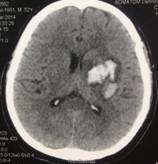C A S E O F T H E M O N T H
HYPERTENSIVE BLEED

A 52-year-old man complained of sudden onset of slurring of speech and right-sided weakness while he was having breakfast. Fearing that he suffered from a stroke, his family rushed him to the nearest emergency room.
On examination, the patient was awake and able to follow commands. He was confused and his speech was slurred. He had weakness on his right side, although he was still able to move his right arm and leg. His blood pressure was high at 180/100. He had already been diagnosed to have hypertension a year ago but he did not take his medication regularly.
CT scan of the brain revealed a bleed in the left basal ganglia, the part of the brain responsible for fine-tuning movements and other functions. The blood clot was not big, measuring approximately 10 cc (around 2 teaspoons) with mild compression of the surrounding brain.
The patient had a type of stroke called hemorrhagic stroke, which occurs when a blood vessel in the brain bursts or ruptures, forming a blood clot. In this case, the cause of the bleed was most likely hypertension. The patient already had a history of hypertension that was poorly controlled, and the location in the brain (basal ganglia) is one of the most common seen in hypertensive bleeds. Since the patient was awake and the blood clot was not big, he was treated conservatively. Surgery is usually considered if the blood clot is large, if there is severe brain compression, and several other factors.
The patient was given medication for his hypertension and stroke. After a few days, physical therapy was started to help him regain his function. He was discharged stable and continued to improve over the subsequent months. His speech became less slurred and he was able to walk with the help of a quad cane. He was advised to take his medicine regularly to prevent a stroke from happening again. He was also advised to lose weight since he was obese, to undergo regular exercise, and to have a low-fat, low-salt diet. |